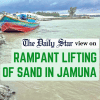Our rivers are being robbed

It is a tragedy that, as another World Rivers Day goes by, instead of celebrating our abundance of rivers, we must actually mourn the death of many and the slow demise of others – all due to human greed. The River and Delta Research Centre (RDRC), a research institute, has found that around 77 rivers face the onslaught of aggressive extraction of sand. Violating the law, individuals connected to power have been extracting sand from innumerable areas of rivers and seashores across the country, with detrimental effects on the biodiversity and ecosystems of these water bodies.
According to a report published in this daily, there are 707 government-announced sand extracting sites, called "Balumahal," out of which 382 have been leased out to different individuals. But apart from these official sites, at least 265 individuals are illegally extracting sand from 132 sites of these 77 rivers. The illegal sites are in all major rivers such as the Padma, Jamuna, Meghna, Brahmaputra, Surma, Sangu, Ichhamoti and Teesta. There are at least seven sites in the Bay of Bengal where sand is being unlawfully extracted. A good number of these people, to the shock of none, are public representatives.
The Bangladesh Balumahal and Soil Management Act, 2023 (an amended law of 2010) was meant to regulate sand extraction activities. Obviously, it is a law merely on paper and little has been done to enforce it. It is frustrating that in spite of endless media reports on illegal extraction of various rivers over the years, as well as the experts' views on the irreversible damage to rivers caused by this insatiable appetite for sand, little has been done to stop the robbing of rivers.
We urge the government to make sincere efforts to stop this human corrosion of our rivers by holding the people or organisations involved accountable. These include some unscrupulous public officials and government agencies that have been carrying out their illegal activities under the nose of the administration. As environmentalists have urged, sand extraction has to be done in a scientific and planned way by conducting proper surveys before dredging the river. Sand extraction sites, moreover, must be monitored closely and law enforcers deployed to make sure sand is not taken away illegally. The government must show its political will to save the country's rivers, not only from sand extraction but other threats such as encroachment and pollution. To do so, it must clamp down on all the culprits, no matter what their political affiliation may be.


 For all latest news, follow The Daily Star's Google News channel.
For all latest news, follow The Daily Star's Google News channel. 










Comments